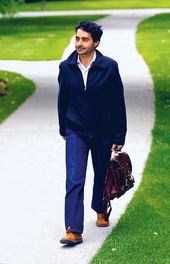
Any curve in the road--or even a hallway that bends--is enough to disorient the 62-year-old to the point where she becomes hopelessly lost.
For Roseman, that disorientation makes everything appear to shift 90 degrees--so west becomes north--leaving her confused and unable to find her way back to her home or office.
"My life is mapped out on straight streets," Roseman said.
Her condition, known as developmental topographical disorientation, was discovered last year by University of Calgary neuroscientist Giuseppe Iaria, who is continuing to study the disorder in the hope of creating a treatment.
Essentially, those suffering from the condition are unable to orient themselves, even in their own homes; once something happens to momentarily interrupt their sense of where they are, they're completely lost.
"They get lost every day. They can't create in their minds a mental map of their environment," Iaria said.
Since then, Iaria and his colleague have been surprised to learn the disorder isn't really all that rare. They have documented more than 400 cases in the past year.
Iaria and his colleague had already been investigating how the brain processes spatial orientation when they uncovered the disorder after encountering a woman from Vancouver who reported getting lost daily. She had no memory or attention problems, no brain damage -- just an inability to work out exactly where she was.
Iaria and his fellow researcher have created an online test that can assess people with topographical disorientation and separate them from those who simply have trouble with maps or lose their vehicles in parking lots.
The tests provide people with a way of examining different orientation skills; the biggest one is the formation and use of a mental map, Iaria said.
Those performances will then be compared to people who don't have the disorder.
"At some point, we'll be able to identify the actual reason why these people get lost," Iaria said.
Denver resident Roseman has had the problem since she was five years old. After playing a game where she was blindfolded and spun in a circle, she took off the blindfold and realized she had no idea where she was.
She was in front of her home at the time. Now, almost six decades later, Roseman wakes up in the morning with the same problem. "I have to learn two different layouts to my home," she said.
As a child, she learned she could undo the disorientation by spinning in circles until she gets a certain sensation that lets her know everything is back to normal. As an adult, she tries to avoid the remedy but, if pressed, will sometimes go into a bathroom stall and spin to right herself.
Roseman hopes Iaria's work will lead to a treatment. "I want to help him to help others, so they don't have to live through what I did."
Take the test



to get herself spatially reoriented. Interestingly, she said she must always spin an even number of times, two or four, in order to get the effect. If she turns an odd number of times she stays disoriented.